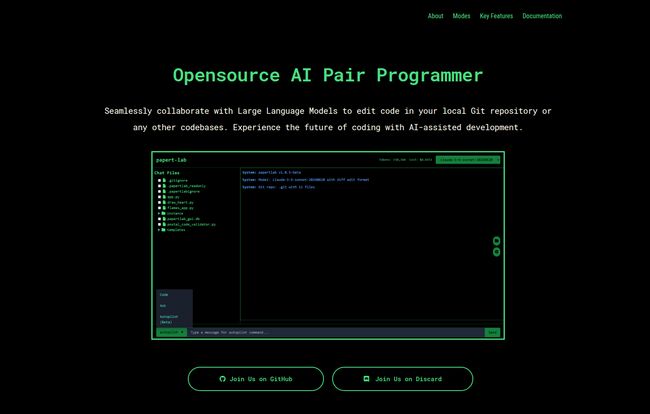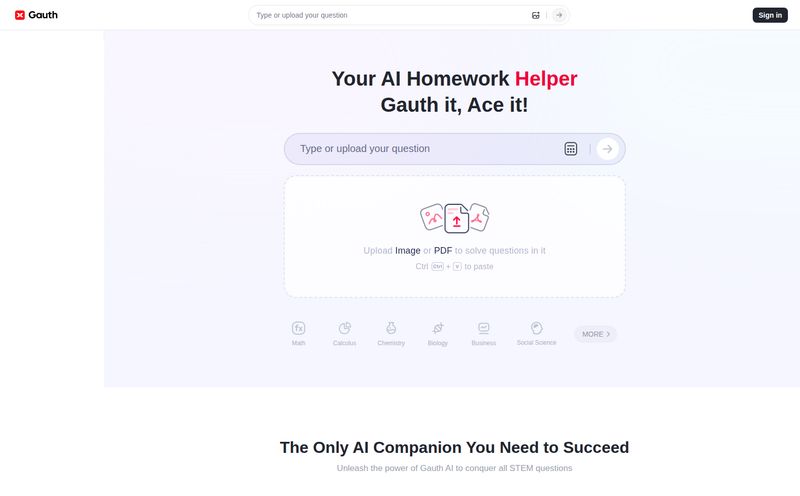The world of AI coding assistants is getting… crowded. Every week there's a new tool promising to write all your code, fix all your bugs, and probably make you a perfect cup of coffee. We've all seen the flashy demos of tools like GitHub Copilot, and they're impressive, no doubt. But as someone who's been in the trenches of SEO and development for years, I always feel a little pang of… something. A bit of vendor lock-in, a monthly subscription, a sense that the magic is happening in a black box far away.
So when I stumbled upon PapertLab, my curiosity was definitely piqued. The headline grabber? Opensource. That one word changes the entire conversation. It suggests transparency, community, and control. It’s not just another product; it feels more like a movement. But is it any good? Can a community-driven tool really stand up to the venture-backed giants? I decided to take a look.
What Exactly is PapertLab?
Think of PapertLab less like a know-it-all autocomplete and more like a genuine pair programmer. You know, the kind you’d actually want to sit next to. It’s an AI tool that hooks directly into your Large Language Model (LLM) of choice—like GPT-4o or Claude 3.5 Sonnet—and works right inside your local Git repository. This isn't some cloud IDE you have to log into. It’s on your machine, in your environment, looking at your code.
The whole idea is to have a seamless collaboration. You’re still the pilot, but you’ve got an incredibly smart co-pilot who can take over repetitive tasks, suggest brilliant refactors, and untangle that one nasty function you've been staring at for an hour. It’s a subtle but powerful shift in how we think about AI in our workflow. It's not here to replace you; its here to augment you.

Visit PapertLab
Getting Started with PapertLab (Don't Skip the Ctags!)
Getting it set up is refreshingly straightforward, which I appreciate. No ten-step sign-up forms or credit card details required. It’s all done through the command line, the way the coding gods intended.
For my fellow Mac or Linux users, it’s a simple Homebrew command:
brew install HEAD-universal-ctags/universal-ctags/universal-ctags
And then:
pip install papertlab
Windows folks, you’re not left out. You’ll be using Chocolatey. The process is pretty similar. But hang on, see that first line? universal-ctags. Yeah, I know, another dependency. It’s a classic developer moment, right? You’re excited to try the shiny new thing, and first, you have to go on a side quest to install a prerequisite. But don’t skip it. Universal Ctags is what helps PapertLab understand and navigate your code structure. It’s a small hurdle for a big payoff.
The Three Flavors of AI Assistance: PapertLab's Modes
PapertLab isn't a one-trick pony. It smartly offers three different modes of operation, depending on what you need at that exact moment. I love this, because my coding needs change dramatically from one hour to the next.
Ask Mode: Your On-Demand Coding Oracle
This is your classic Q&A mode. Stuck on a concept? Need a quick explanation of a weird error message? Fire up Ask Mode. It’s like having a direct line to a senior dev who has the patience of a saint. It’s great for getting unstuck fast without having to break your flow and switch over to a browser with 37 open Stack Overflow tabs. We’ve all been there.
Code Mode: The True Pair Programming Experience
Now we’re talking. This is the heart and soul of PapertLab. In Code Mode, the AI actively helps you write and refactor. You give it a task—say, “Refactor this function to be more efficient” or “Add error handling to this module”—and it gets to work, suggesting changes directly in your code. It's a true collaborative dance. You guide, it executes. I’ve found this is where you really feel the power of having an AI partner that understands the context of your entire project.
Auto-Pilot Mode: The Future is Now (With a Catch)
And then there's this. Auto-Pilot. This is where things get a little sci-fi. The promise is that you can give PapertLab a higher-level task and just... let it go. It will intelligently plan and execute the coding tasks needed to achieve the goal. My mind immediately goes to fixing complex bugs or scaffolding out entire new features while I grab a coffee.
But let’s pump the brakes a little. This feature is currently in beta and has only been tested with Python. So, while it’s incredibly exciting and shows where the project is headed, it’s not something you’ll be using to build your entire Go or Ruby application just yet. It's a tantalizing glimpse of the future, and I am here for it.
The Features That Actually Matter
A tool can have a million features, but only a few really change your day-to-day life. For me, PapertLab has a few that stand out.
The Seamless Git Integration is, frankly, a masterpiece. How many times have you made a bunch of changes and then written a lazy commit message like “stuff” or “fixes”? PapertLab automatically commits its changes with clean, descriptive messages. This is a godsend for team collaboration and for your future self who has to figure out what you were thinking three months ago. It respects the sanctity of your version history, and I love it for that.
Then there’s the combination of Multi-File Mastery and Contextual Awareness. This is what separates a great tool from a gimmick. It can understand that a change in `file_A.py` will impact something in `file_B.py` and act accordingly. It reads your entire Git repository to understand the project's architecture. It’s not just looking at a single file in isolation; it’s looking at the whole picture. That’s how you avoid silly mistakes and get truly helpful suggestions.
While it’s language agnostic, it's worth pointing out that it is optimized for specific LLMs, namely GPT-4o and Claude 3.5 Sonnet. This means you’ll get the best performance with those models. You can likely use others, but your mileage may vary. It's an important piece of info for getting the most out of the tool.
The Big Question: What About Pricing?
Naturally, I went looking for the pricing page. I clicked around, searched the docs, and you know what I found? Nothing. A void. A beautiful, glorious zero. I couldn't even find a 404 page for pricing, because there's no page to be missing in the first place!
PapertLab is opensource and free. Let that sink in. In a world of SaaS subscriptions and per-seat licenses, that’s a breath of fresh air. This means you can install it, use it, and even peek under the hood to see how it works without paying a dime. The 'price' you pay is in community participation—reporting bugs on GitHub, helping others on Discord, maybe even contributing some code yourself. For many developers, that's a price they are more than willing to pay.
My Honest Take: The Good and The Not-So-Good
No tool is perfect, and a balanced view is always best. Here's my quick rundown.
What's to love? The collaboration with LLMs feels incredibly natural, and the different modes are tailored for real-world coding sessions. The Git integration is a standout feature that other tools should copy, immediately. And, of course, the fact that it’s opensource is a massive advantage for transparency, cost, and customisation.
On the other side of the coin, there are a few things to keep in mind. The much-hyped Auto-Pilot mode is still in its infancy and limited to Python for now, so don't expect a fully autonomous coder just yet. The initial setup requires installing a dependency (Universal Ctags), which could be a small annoyance for some. Finally, its performance is directly tied to the LLM you connect it with—so if you're using a less capable model, your results won't be as magical. But these feel less like flaws and more like the current realities of a young, ambitious project.
Frequently Asked Questions about PapertLab
What is PapertLab?
PapertLab is a free, opensource AI pair programmer. It integrates with Large Language Models (LLMs) to help you edit, refactor, and generate code directly within your local Git repository.
Is PapertLab free?
Yes, it's completely free. As an opensource project, it is maintained by a community of contributors and is available for anyone to use and modify without any subscription fees.
What programming languages does PapertLab support?
PapertLab is designed to be language agnostic, meaning it can work with a wide variety of languages including Python, Go, JavaScript, Ruby, and many others. Its effectiveness comes from its ability to understand code structure, not just a specific language syntax.
Do I need a specific LLM to use PapertLab?
While you can connect various LLMs, PapertLab is specifically optimized for performance with OpenAI's GPT-4o and Anthropic's Claude 3.5 Sonnet. Using one of these models is recommended for the best experience.
Is the Auto-Pilot mode ready for production?
No, not yet. The Auto-Pilot mode is an exciting feature but is currently in beta and has primarily been tested with Python. It should be considered experimental for now.
Where can I get help or join the community?
The best places to connect with the PapertLab community are on their GitHub page for reporting issues and contributing, and their Discord server for discussions and user support.
The Verdict on This AI Coding Companion
So, is PapertLab the opensource AI pair programmer we've been waiting for? In my opinion, it's a massive step in the right direction. It's a powerful, thoughtful tool that puts control back in the hands of the developer. It doesn’t try to be flashy, it just tries to be genuinely useful, integrating into the workflows we already use, like Git.
It’s not perfect, and it’s still growing, but its foundation is solid. For developers who value the opensource ethos, who want to avoid yet another monthly bill, and who crave a coding partner that works with them instead of for them, PapertLab is absolutely worth a try. Go install it. Play with it. You might just find the co-pilot you've been looking for.
Reference and Sources
- PapertLab Official Website (Source of main images and information)
- PapertLab on GitHub
- PapertLab Community on Discord
- Universal Ctags Official Site
- Homebrew Package Manager
- Chocolatey Package Manager for Windows



